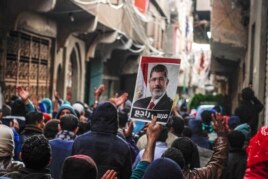12 February, 2017
The United States last added a group to its list of Foreign Terrorist Organizations on June 30, 2016.
On that day, the Obama administration put al-Qaida in the Indian Subcontinental on the list. It said the group carried out attacks in Pakistan and murdered writers and activists in Bangladesh.
President Donald Trump is considering adding two more groups: the Muslim Brotherhood and Iran's Revolutionary Guard Corps.
Ted Cruz: It is time to call this enemy
Senator Ted Cruz of Texas lost out to Trump for the Republican Party presidential nomination. He and other Republicans in Congress last month proposed bills that ask Trump to consider adding the Brotherhood and Iran's Revolutionary Guard to the terrorist list.
"It is time to call this enemy by its name and speak with clarity and moral authority," Cruz said.
The Iranian Revolutionary Guard Corps is Iran's main security group. It also controls large parts of Iran's economy and is a major influence on its politics.
Opponents of naming the Iranian Guard a terrorist organization worry the move could do more harm than good. They say it likely would increase support for Iranian hardliners, reducing the influence of moderate leaders.
The Muslim Brotherhood wants countries to be governed by Islamic Law. The Muslim Brotherhood's Mohamed Morsi was elected president of Egypt in 2012. But he was removed by the military, led by Abdel Fattah el-Sisi, one year later.
After taking over as the country's president, el-Sisi has banned the Muslim Brotherhood. And he has been calling on the U.S. to add the group to its terrorist list.

Supporters of ousted Islamist President Mohamed Morsi march in 2016. Morsi represented the Muslim Brotherhood, which was banned by Egypt's current government.
There is also opposition to putting the Muslim Brotherhood on the terrorist list.
The Council on American-Islamic Relations works to protect civil liberties of American Muslims. Ibrahim Cooper speaks for the group, which also opposes President Trump's executive order blocking travel to the U.S. from seven majority Muslim nations. A court has put the order on hold.
Cooper told VOA that those pushing for the terrorist declaration are trying to connect American Muslims to the Muslim Brotherhood. Such a declaration, he said, would be used "in a political campaign to attack" American Muslims.
But important advisers to President Trump support the terrorist declaration for the Brotherhood. Among them is his chief strategist Stephen Bannon, the former head of Breitbart News. He has called the Brotherhood the "foundation of modern terrorism."
Sean Spicer is the press secretary for President Trump. He would not say if Trump is ready to declare the Brotherhood and Iran's Revolutionary Guard terrorist organizations. But he said the president's main goal is to "attack" and "destroy" Islamic terrorism.
The Egyptian government recently ordered 1,500 people to appear in court on charges of helping fund the Muslim Brotherhood.
Human Rights Watch said the action amounts to "indiscriminate use" of Egypt's anti-terrorism laws.
What happens to groups on U.S. terrorism list?
American people and businesses are prohibited from doing business with groups on the foreign terrorist organizations' list. And the groups and their members are prohibited from using any money or other holdings they own in the U.S.
Since 1997, 61 groups have been declared terrorist groups by the U.S. government.
The list includes some of the world's deadliest terrorist groups. Among them are al-Qaida, the Islamic State, al-Shabaab, and Boko Haram.
Other well-known groups on the list include HAMAS, and Hezbollah.
Twelve of the groups were removed because they are no longer considered a threat. Among those removed was the Khmer Rouge. The group was responsible for 2 million deaths in Cambodia from 1975 to 1979.
I'm Alice Bryant.
Bruce Alpert reported this story for VOA Learning English with materials from VOA News, Reuters and other sources. Hai Do was the editor.
We want to hear from you. Write to us in the Comments Section and share your views on 51VOA.COM.
_______________________________________________________________
Words in This Story
clarity - n. the quality of being expressed, remembered, understood, etc., in a very exact way
authority - n. a quality that makes something seem true or real
hardliner - n. someone considered to have radical and unbending opinions
foundation - n. something such as an idea or principle that provides support for something
indiscriminate - adj. affecting or harming many people or things in a careless or unfair way
holdings - n. things owned by individuals or groups, such as real estate
prohibit - v. to order (someone) not to use or do something